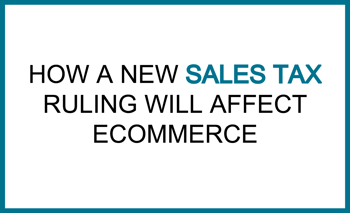South Dakota v. Wayfair Inc.: A Crash Course
 A recent 5-4 ruling by Chief Justice John Roberts has flipped eCommerce on its head by overruling the previous sales tax rule that a company must have a physical presence within the state to charge sales tax. It is now the decision of the state if they want to charge sales tax on eCommerce transactions. The verdict was reached by the idea that the internet has changed how we conduct business therefore our tax codes need to reflect this. With this new wave of change comes a lot of questions and unknowns for the eCommerce world.
A recent 5-4 ruling by Chief Justice John Roberts has flipped eCommerce on its head by overruling the previous sales tax rule that a company must have a physical presence within the state to charge sales tax. It is now the decision of the state if they want to charge sales tax on eCommerce transactions. The verdict was reached by the idea that the internet has changed how we conduct business therefore our tax codes need to reflect this. With this new wave of change comes a lot of questions and unknowns for the eCommerce world.
Who Will This Impact?
Businesses across the board will be impacted by South Dakota’s ruling. For larger companies such as Amazon and Wayfair the impact is a lot less significant than for those of independent retailers or small mom and pop shops. Larger online retailers are already required to pay sales tax in many states as they have a plethora of brick and mortar locations such as offices and warehouses. Smaller companies on the other hand will experience a bigger impact as they were not previously required to pay sales tax in jurisdictions where their physical stores were not located. With tax guidelines unique to each state comes an onslaught of administrative responsibility. Small business owners are worried about their ability to accurately keep up with the changing tax codes and fear that this will result in a loss of jobs and profit.
South Dakota has also decided that it will not make a difference what you are selling, all eCommerce business, both product and services, will be subject to taxation. For example, if you are running an advising firm in Ohio and you communicate with a client in California through email, you will be required to charge sales tax as this counts as a sales transaction.
While South Dakota has decided all eCommerce transactions will be taxed, a variety of other states have set requirements such as $100,000 of gross profit a year or that a certain number of items must be sold before you are required to pay sales tax. These benchmarks may be detrimental to smaller businesses as the profit increase between the 200th and 201st products may only be one dollar but will be required to pay sales tax on all items sold. This can result in the sales of products becoming more negative than positive for small businesses because the taxes you are required to pay may outweigh the profit made. Under these circumstances, it is imperative that small businesses are resourcefully monitoring regulations or administrative work will swallow them whole.
What is to Come?
There is a lot of unknown surrounding the future of sales tax and eCommerce. However, there are a few things you should be aware of when moving forward. While no state has spoken on retroactivity or notice and report, tax experts advise you to begin exploring how these can apply to your business’s past transactions, as they have the potential to surface. Your company should also continue to closely monitor other states you do business in. In fact, 13 states have plans to implement new sales tax regulations that were forced to the back burner in 2016. For instance, Vermont has already implemented new sales tax code that will affect eCommerce merchants conducting business in their jurisdiction. This is just the beginning of the new relationship between sales tax and eCommerce, and the more your company is prepared for the better they will be able to handle the upcoming changes.
How Should I Handle This?
Tax regulations change often and while it seems like the end of the world, your company will figure it out. The most important thing is to stay calm and get educated. Contact a trusted CPA or your financial advisors and start to familiarize yourself with what will be expected of your business. Tax experts also advise smaller companies to investigate partnering with tax software that can help reduce the administrative work they are bound to experience. The more you know the better your company will be able to handle the impending change.
Let Avalara Help!
Tax rules and regulations are ever-evolving and can be extremely complicated to navigate. With 45 different states all possessing unique tax codes, it is important to work with an educated and reliable tax software. Avalara can help your company navigate the choppy waters of tax, providing you with the most accurate and efficient information and customized tax payment plans for your company.

